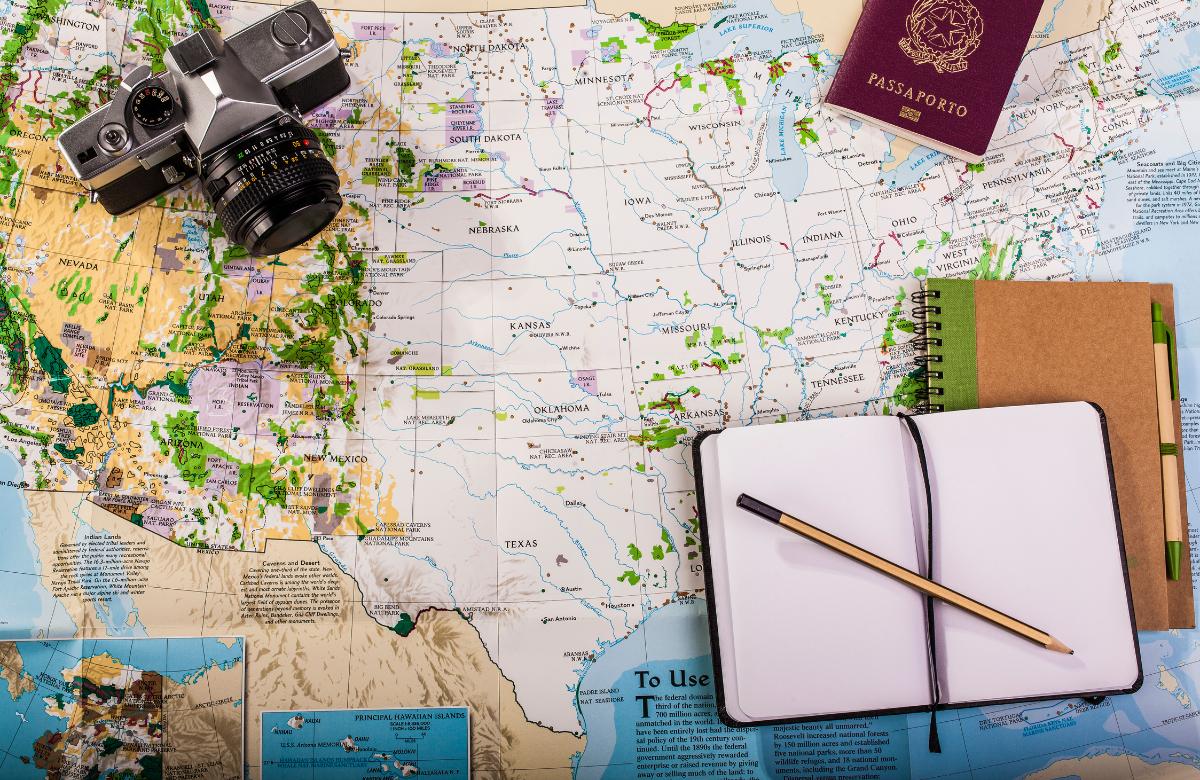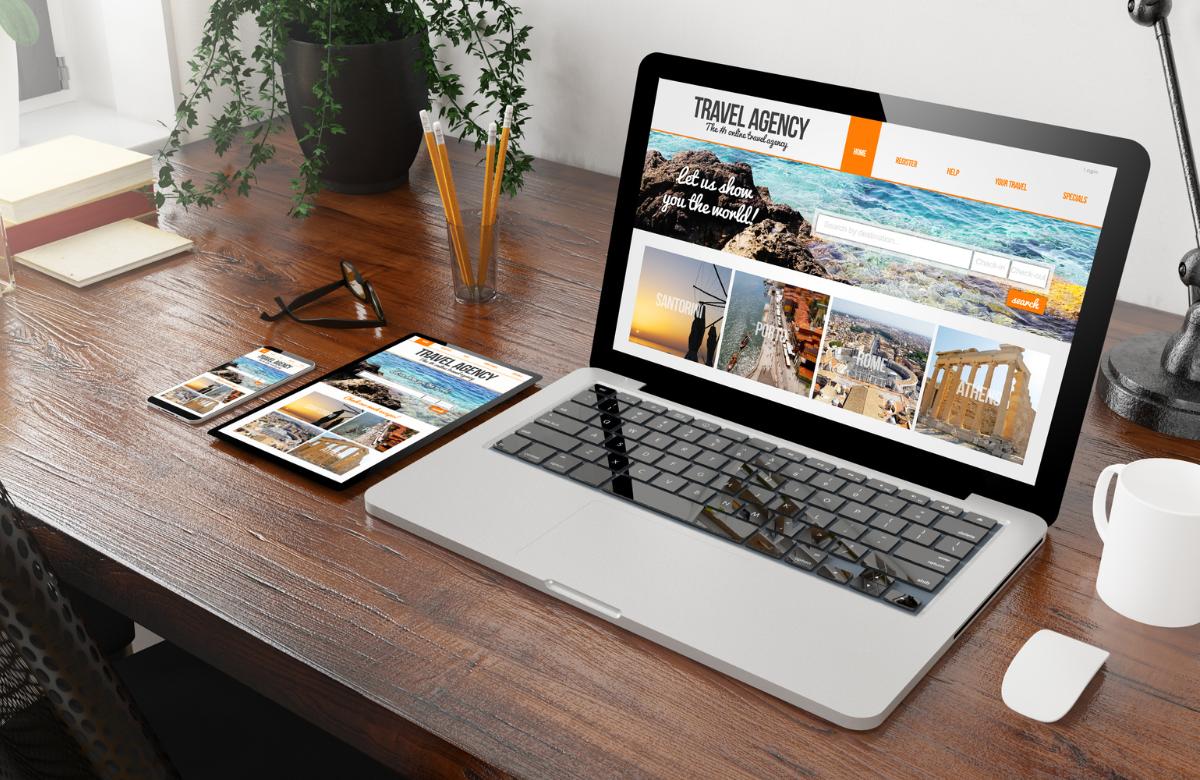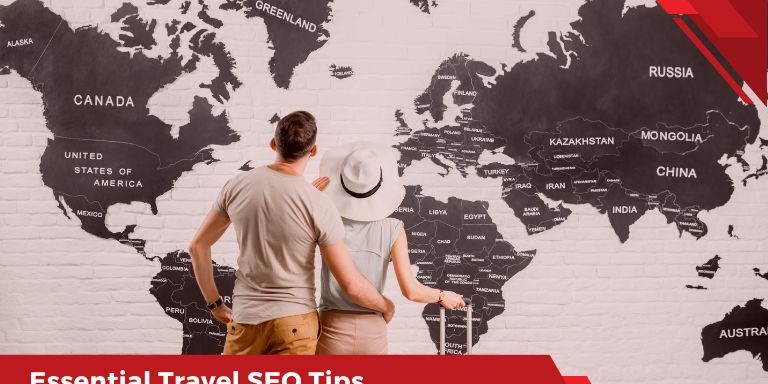Introduction To Travel SEO
In the bustling realm of travel, standing out in the digital landscape is a challenge that demands strategic acumen. But what if there was a way to boost your online visibility and connect with potential travellers more effectively? Enter the world of Travel SEO, a powerful tool that serves as a beacon, guiding your travel business to the top of search engine results.
Key Takeaways
- Master the art of keyword selection to attract more traffic and improve search results.
- Incorporate seasonal trends, create quality content, optimise for both SEO and readership and build relationships with other websites to drive organic traffic.
- Leverage social media integration for shareable content, direct website visitors & influencer collaborations.
Mastering The Art Of Keyword Selection For Travel SEO



Link building, which involves establishing backlinks to a travel website from credible sources, is pivotal in boosting search engine rankings and fortifying the website’s trustworthiness and influence. It’s like receiving recommendations from trusted friends, which naturally increase your credibility.
Building relationships with other websites, including travel websites, leveraging social media, and guest posting on travel blogs and publications are just a few tactics to consider.
Building Relationships With Other Travel Websites
Establishing relationships with other travel websites is akin to forming alliances with fellow travellers. These relationships can boost your visibility and significance in search engine inquiries, thereby driving more traffic to your site. This includes building relationships with travel bloggers, tracking partnership success, and offering personalised content.
Leveraging Social Media For Link Opportunities
Social media is like a bustling market in a foreign city – a place full of potential connections and opportunities. Utilising social media for link building offers several advantages, such as heightened brand awareness, enhanced search engine rankings, and improved customer engagement.
By sharing engaging content, promoting special offers, and interacting with your audience, you can create numerous link opportunities.
Guest Posting On Travel Blogs And Publications
Guest posting is like being a guest speaker at a travel conference – it provides an opportunity to share your knowledge with a larger audience, gain exposure, and build credibility. By contributing relevant, high-quality content to reputable travel blogs and publications, you can gain valuable backlinks and attract more traffic to your website.
Local SEO Tactics For Travel Agencies And Tour Operators

Local SEO tactics are like local travel guides – they help you appeal to the specific needs and preferences of travellers in a particular location. By claiming and optimising your Google Business profile, encouraging online reviews, and incorporating local keywords and content, you can improve your visibility among potential customers in your target areas.
Claiming And Optimizing Your Google Business Profile
Claiming and optimising your Google Business Profile is like putting up a signboard in front of your travel agency – it helps potential customers find you more easily. A comprehensive Google Business profile should encompass:
- Business name
- Address
- Phone number
- Website URL
- Business hours
- Detailed description of your services
Encouraging Online Reviews And Ratings
Online reviews and ratings are like word-of-mouth recommendations – they play a crucial role in shaping the success of travel businesses. By promoting customer feedback and managing your online reputation effectively, you can build trust and credibility in the travel industry.
Incorporating Local Keywords And Content
Incorporating local keywords and content is like offering tours tailored to specific local attractions. By addressing the specific needs and preferences of travellers in a particular location, you can attract more relevant traffic to your website and improve your search engine visibility.
Analyzing And Adapting: The Role Of Google Analytics In Travel SEO
Analysing and adapting your SEO strategy is essential to its success, much like how a seasoned traveller refines future travel plans based on past experiences. Google Analytics serves as a powerful tool in this process, offering insights into key performance indicators, user engagement, and traffic sources.
Monitoring Key Performance Indicators (KPIs)
Keeping track of key performance indicators (KPIs) resembles the practice of regularly checking your travel itinerary to ensure you’re on the right path. Some essential KPIs for assessing the success of your SEO efforts include:
- Organic traffic volume
- Conversion rate
- Organic visibility
- Keyword rankings
Interpreting User Engagement And Traffic Sources
The act of interpreting user engagement and traffic sources parallels understanding the demographics and preferences of tourists visiting a specific destination. It helps you understand:
- How effectively your website or app is engaging users
- How users are finding your website or app
- Which pages or features are most popular
- How long users are staying on your website or app
- How often users are returning to your website or app
This information can be used to optimise your strategies and improve user experience.
Making Data-Driven Decisions To Optimize SEO Efforts
The practice of making data-driven decisions can be likened to referring to a travel guidebook before selecting which sites to visit. By analysing and interpreting data from Google Analytics, you can understand your website’s performance, identify areas for improvement, and make informed decisions to refine your SEO efforts.
Maximizing Visibility Through Technical SEO Best Practices

Technical SEO, akin to the engine of your travel vehicle, propels your journey up the search rankings. By enhancing page load speed, implementing responsive design for mobile users, and structuring URLs and site architecture, you can improve the search engine’s ability to index your site, thereby maximising visibility and search engine optimization on search engine results pages.
Enhancing Page Load Speed For Better User Experience
A fast-loading website can significantly uplift the user experience, similar to how a swift and comfortable journey enhances a traveller’s experience. By optimising your website’s performance and enhancing page load speed, you can decrease bounce rates and enhance overall user engagement, leading to potential benefits such as improved search rankings.
Implementing Responsive Design For Mobile Users
The implementation of a responsive design resembles offering a universal travel guide that functions smoothly on any device, whether it’s a smartphone or desktop. With a significant number of users relying on mobile devices for their travel planning and booking, a responsive design ensures a seamless browsing experience across devices.
Structuring URLs And Site Architecture For SEO
Designing an SEO-friendly URL structure and site architecture mirrors the process of creating a user-friendly city map. Proper URL structure and site architecture can enhance your website’s usability, improve search engine indexing, and enhance user comprehension of your site’s content hierarchy.
Engaging Potential Customers With Social Media Integration
Integrating social media into your strategy feels akin to hosting a lively travel fair, a place to connect with potential customers, disseminate valuable insights, and display your unique services. By creating shareable content, using social media to drive direct traffic, and collaborating with influencers, you can significantly increase your brand’s visibility and reach a wider audience.
Creating Shareable Content For Social Media Platforms
The creation of shareable content for social media can be paralleled with the crafting of an enticing travel brochure, brimming with eye-catching images and compelling descriptions. By developing high-quality, engaging content, you can attract more followers, increase user interaction, and enhance your brand’s visibility through content marketing.
Using Social Media To Drive Direct Traffic To Your Website
Leveraging social media to funnel direct traffic to your website is akin to utilising a billboard on a bustling street to guide travellers to your agency. By sharing engaging content, promoting special offers, and interacting with your audience, you can drive more traffic to your website and attract potential customers.
Collaborating With Influencers In The Travel Niche
Partnering with influencers within the travel niche bears resemblance to earning an endorsement from a renowned travel guide for your agency. Influencers have a loyal following of individuals who trust their recommendations, and a partnership with them can significantly increase your brand’s visibility and credibility.
Elevate Your Travel Brand With IMarketing’s Proven SEO Expertise!
To stand out in the thriving digital landscape of the travel industry, mastering SEO is a necessity. From carefully selecting keywords to crafting engaging content, utilising link-building strategies, and implementing technical SEO best practices, there’s much to consider. However, with the right tools, such as Google Analytics, and a strategic approach, you can optimise your travel website, drive organic traffic, and reach your target audience more effectively.
Ready to skyrocket your travel business’s online visibility? Partner with iMarketing, the leading SEO company specialising in tailored solutions for the travel industry. Our team of experts is equipped with the latest strategies to boost your website’s search engine rankings, drive organic traffic, and increase conversions. Elevate your online presence and take your travel business to new heights. Contact iMarketing today for a personalised SEO strategy that aligns with your goals and propels your brand forward.






